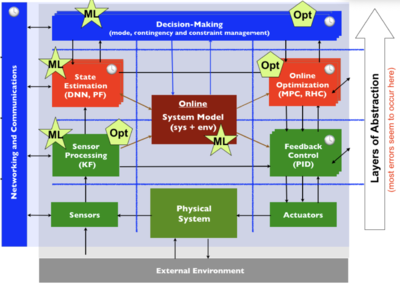Safety-Critical Cyber-Physical Systems: From Validation & Verification to Test & Evaluation: Difference between revisions
No edit summary |
No edit summary |
||
| (6 intermediate revisions by the same user not shown) | |||
| Line 1: | Line 1: | ||
The goal of this project is to advance the state of the art in design of autonomous Cyber-Physical Systems (CPS) by integrating tools from computer science and control theory. With the rise in deployment of autonomous CPS--from automotive to aerospace to robotic systems--there is a pressing need to design systems whose properties can be verified and validated to ensure their safe operation. The work will help establish the scientific basis for design of systems that are amenable to rigorous test and evaluation methods, especially as the systems interact with other agents and the world in highly dynamic ways. This has the potential to inform the development and deployment of complex CPS in a variety of application domains: from (semi-) autonomous cars, to safety features in aviation, to robotic systems for industrial applications and space exploration. | The goal of this project is to advance the state of the art in design of autonomous Cyber-Physical Systems (CPS) by integrating tools from computer science and control theory. With the rise in deployment of autonomous CPS--from automotive to aerospace to robotic systems--there is a pressing need to design systems whose properties can be verified and validated to ensure their safe operation. The work will help establish the scientific basis for design of systems that are amenable to rigorous test and evaluation methods, especially as the systems interact with other agents and the world in highly dynamic ways. This has the potential to inform the development and deployment of complex CPS in a variety of application domains: from (semi-) autonomous cars, to safety features in aviation, to robotic systems for industrial applications and space exploration. | ||
{| cellpadding=0 cellspacing=0 width=80% | {| cellpadding=0 cellspacing=0 width=80% | ||
| Line 18: | Line 10: | ||
| | | | ||
Collaborators: | Collaborators: | ||
* Aaron Ames (Caltech, PI) | |||
Past participants: | Past participants: | ||
| Line 24: | Line 17: | ||
=== Objectives === | === Objectives === | ||
[[Image: | [[Image:NSF-testandeval.png|right|400px]] | ||
The work in our group is focused on the use of tools from formal methods as a mechanism for specification and design of provably correct control systems: | |||
* Design of provably correct layered control protocols through the use of vertical assume/guarantee contracts that link design at different layers of abstraction (feedback control, trajectory generation, supervisory control). | |||
* Design of control algorithms that provide resilience to failures in sensing, perception, prediction, and actuation while maintaining safe operation of the system. | |||
* Experimental implementation of algorithms on laboratory testbeds that demonstrate the use of software tools for specification, design, and synthesis of control protocols. | |||
=== References === | === References === | ||
{{project paper list}} | {{project paper list}} | ||
[[Category: | [[Category:Completed projects]] | ||
[[Category:NCS projects]] | |||
{{Project | {{Project | ||
|Title=Safety-Critical Cyber-Physical Systems: From Validation & Verification to Test & Evaluation | |Title=Safety-Critical Cyber-Physical Systems: From Validation & Verification to Test & Evaluation | ||
| Line 37: | Line 36: | ||
|Grant number=CNS-1932091 | |Grant number=CNS-1932091 | ||
|Start date=1 Oct 2019 | |Start date=1 Oct 2019 | ||
|End date=30 Sep | |End date=30 Sep 2024 | ||
|Support summary=2 graduate students, 1 postdoc | |Support summary=2 graduate students, 1 postdoc | ||
|Reporting requirements=Annual reports | |Reporting requirements=Annual reports | ||
Latest revision as of 17:31, 5 October 2024
The goal of this project is to advance the state of the art in design of autonomous Cyber-Physical Systems (CPS) by integrating tools from computer science and control theory. With the rise in deployment of autonomous CPS--from automotive to aerospace to robotic systems--there is a pressing need to design systems whose properties can be verified and validated to ensure their safe operation. The work will help establish the scientific basis for design of systems that are amenable to rigorous test and evaluation methods, especially as the systems interact with other agents and the world in highly dynamic ways. This has the potential to inform the development and deployment of complex CPS in a variety of application domains: from (semi-) autonomous cars, to safety features in aviation, to robotic systems for industrial applications and space exploration.
|
Current participants: Additional participants:
|
Collaborators:
Past participants:
|
Objectives
The work in our group is focused on the use of tools from formal methods as a mechanism for specification and design of provably correct control systems:
- Design of provably correct layered control protocols through the use of vertical assume/guarantee contracts that link design at different layers of abstraction (feedback control, trajectory generation, supervisory control).
- Design of control algorithms that provide resilience to failures in sensing, perception, prediction, and actuation while maintaining safe operation of the system.
- Experimental implementation of algorithms on laboratory testbeds that demonstrate the use of software tools for specification, design, and synthesis of control protocols.
References
- Failure-Tolerant Contract-Based Design of an Automated Valet Parking System using a Directive-Response Architecture. Josefine Graebener, Tung Phan-Minh, Jiaqi Yan, Qiming Zhao, Richard M. Murray. Submitted, 2021 Conference on Decision and Control (CDC).
- Time-Optimal Navigation in Uncertain Environments with High-Level Specifications. Ugo Rosolia, Mohamadreza Ahmadi, Richard M. Murray, Aaron D. Ames. To appear, 2021 Conference on Decision and Control (CDC).
- Reactive motion planning with probabilistic safety guarantees. Yuxiao Chen, Ugo Rosolia, Chuchu Fan, Aaron D. Ames, Richard M. Murray. Submitted, Conference on Robotic Learning (CoRL).
This project is supported by the National Science Foundation (CNS-1932091)
|
|
|
